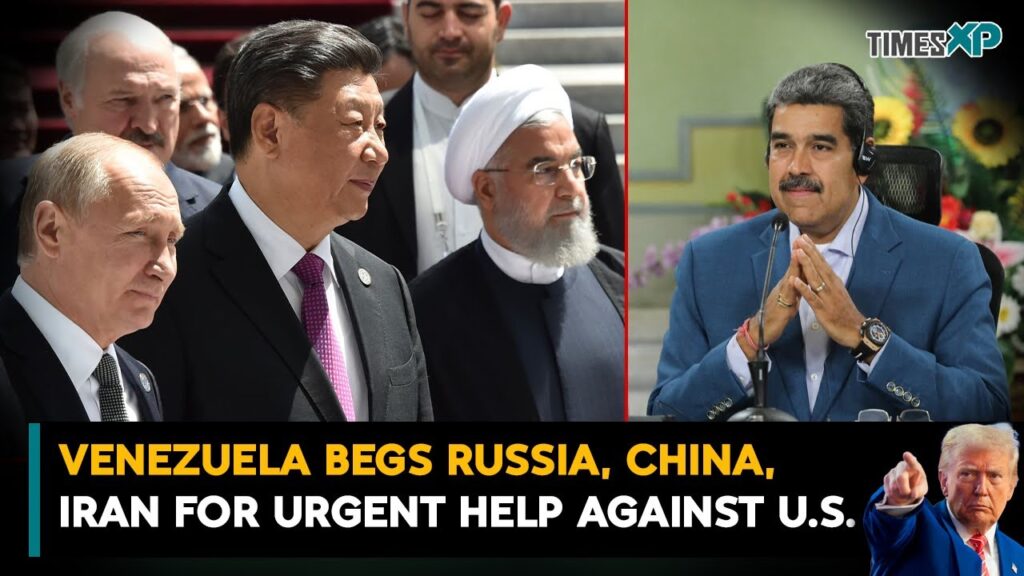Why Pressuring Venezuela Is the Smartest Way to Counter the China–Russia–Iran Nexus in a Multipolar World
In the alphabet soup of global strategy, “multipolarity” is the new euphemism for power diffusion. Washington’s unipolar moment—the post-Cold War illusion that free markets and fiber-optic cables could make everyone behave—has given way to a chessboard where the pieces are alive and clawing for control. Beijing wants the 21st century to speak Mandarin; Moscow wants the Soviet ghost to breathe again; Tehran wants to export its revolution with fewer apologies.
In that context, the Western Hemisphere isn’t an afterthought. It’s the testing ground. And Venezuela is the hinge—the one failed state that connects all three of America’s strategic adversaries without a single aircraft carrier crossing an ocean.
The Multipolar Mirage
Multipolarity sounds democratic. Multiple poles of power, everyone gets a say. In practice, it’s a polite rebrand of authoritarian syndication—an alliance of convenience among states united not by ideology but by grievance. China provides capital and surveillance tech; Russia offers oil logistics and arms; Iran contributes drones, disinformation, and deniable militias. Together, they form a barter system of disruption.
For Beijing, the multipolar world is a way to neutralize U.S. deterrence without firing a shot—replace the dollar with yuan in bilateral deals, expand Belt and Road beyond Asia, and use state-backed loans to launder influence. For Moscow, it’s a geopolitical rehab program: sanctions have made Western Europe off-limits, so Latin America becomes a mirror market. And for Tehran, it’s a rare chance to stretch its revolutionary brand into the Western Hemisphere, where anti-Americanism is a growth sector.
Every one of those ambitions intersects in Caracas.
China’s Latin Launchpad
Venezuela was one of the first South American countries to sign onto China’s Belt and Road Initiative, and the relationship has since “upgraded” to what both regimes call an “all-weather strategic partnership.” Beneath the slogans are the mechanics of dependency: Chinese loans denominated in oil, construction projects tied to Chinese contractors, and satellite cooperation that blurs the line between commercial and military.
In 2023, Xi Jinping and Nicolás Maduro inked new agreements on space technology, civil aviation, and telecommunications—all dual-use domains where China has a record of embedding intelligence footholds. Venezuela, in turn, gains prestige, surveillance infrastructure, and insulation from Western pressure. Beijing doesn’t need Caracas to be rich; it needs Caracas to be useful.
Russia’s Sanctions Escape Hatch
For Moscow, Venezuela is both a refueling stop and a proof of concept. After the invasion of Ukraine triggered the most extensive sanctions regime in modern history, the Kremlin adapted with smuggler’s efficiency. Using a shadow “dark fleet” of tankers, Russia began blending and re-flagging oil across sympathetic ports. Caracas, already operating under its own sanctions, became a natural partner in that system.
Russian state firms like Rosneft and obscure intermediaries handle crude swaps and logistics through Venezuelan terminals, while military cooperation keeps the political bond tight. Russian bombers have landed in Venezuela before—not for war, but for symbolism. The message is simple: we can still project power in America’s neighborhood.
Iran’s Western Hemisphere Proxy
Tehran’s interests are more opportunistic but equally strategic. Cut off from Western markets and desperate for new clients, Iran has exported its drone technology to Venezuela in deals that go far beyond consumer goods. Venezuelan officers have reportedly trained in Iran on the use of Shahed-style drones, while Iranian engineers assist in building domestic production capacity. The symbolism is potent: a Middle Eastern theocracy and a South American dictatorship trading the tools of asymmetric warfare.
Add in Hezbollah’s documented networks across Latin America’s tri-border region and Venezuelan passports handed out to questionable intermediaries, and the result is an ecosystem where ideology and organized crime merge. Tehran doesn’t need a base in the Caribbean—it just needs friends with airfields.
The Cheap Lever
Here’s the irony: confronting any of those three powers directly requires a defense budget, carrier groups, and congressional briefings. Confronting Venezuela requires none of that. The United States already holds the sanctions architecture, the economic levers, and the moral high ground.
In 2022 and 2023, Washington briefly eased energy sanctions in hopes of coaxing Maduro into fair elections. Instead, he tightened his grip, flirted with invading Guyana’s Essequibo region, and deepened his ties with China and Iran. The message from Caracas was clear: temporary relief buys time, not reform.
That’s what makes Venezuela the ideal pressure point in a multipolar world. It’s geographically proximate, diplomatically isolated, and economically vulnerable. Every dollar or drone that moves through Caracas strengthens the nexus Washington claims to oppose. Every sanction re-imposed with precision weakens three regimes at once.
A Target-Rich Environment
The playbook isn’t complicated. Start with energy and gold sanctions tied to verifiable electoral benchmarks; revoke licenses if unmet. Expand maritime interdiction against the dark fleet using flag registries and insurance chokepoints. Backstop Guyana militarily and diplomatically to deter Venezuelan adventurism. Fund counter-UAS programs in the region to expose and neutralize Iran’s drone footprint. And finally, weaponize transparency—publicly document how Chinese and Russian state enterprises use Venezuela as a sandbox for influence operations.
Each move would trigger predictable outrage from Caracas and its patrons, which is the point. The U.S. doesn’t need to invade or occupy—it simply needs to make Venezuela a liability instead of an asset for Beijing, Moscow, and Tehran.
The Counterarguments—and Why They Fail
“Sanctions only hurt civilians.” True when used indiscriminately, false when targeted. Elite pain points—shipping insurance, precious metals, dual-use imports—can be squeezed without crushing the population. Carve out humanitarian exemptions and tie relief directly to behavior, not promises.
“Engagement stabilizes.” Engagement is what produced the current instability. In multipolar politics, “dialogue” often means “delay until the next shipment clears customs.”
“We should focus on China and Russia directly.” Of course we should. But power projection works best through efficiency, not ego. In complex systems, leverage doesn’t come from size—it comes from position. Caracas sits at the junction of three adversarial supply chains. Push there, and the tremors travel far.
Multipolarity Starts at Home
America can’t reclaim global primacy through nostalgia, but it can reclaim initiative. Multipolarity is only destiny if the United States stops shaping outcomes. By treating Venezuela not as a charity case but as the operational nerve of the China–Russia–Iran axis, Washington can reset the geometry of influence in its own hemisphere.
The new world order may be multipolar, but geography is not. And when the map is drawn honestly, Caracas is closer than Beijing, cheaper than Moscow, and less risky than Tehran. That makes it the smartest fight to pick—because winning it would collapse the triangle holding the rest together.
Citations
- Reuters – “China and Venezuela upgrade ties, sign cooperation deals in economy, space, and aviation” (September 13, 2023)
- CSIS – “Great Power Competition in Latin America: SOUTHCOM’s Strategic Outlook” (2025)
- Washington Post – “Iranian drones and electronic warfare equipment flow to Venezuela” (February 21, 2024)
- Reuters – “How Russia’s dark fleet evades sanctions” (March 12, 2025)
- Al Jazeera – “Xi, Maduro pledge to deepen China–Venezuela cooperation” (September 13, 2023)
- CSIS – “Venezuela–Guyana Border Dispute: The Essequibo Flashpoint” (January 17, 2024)
- Associated Press – “U.S. to reimpose some sanctions on Venezuela after election concerns” (April 24, 2025)
- Guardian – “Guyana accuses Venezuela of escalation over Essequibo region” (December 10, 2024)
- Iran International – “Iran–Venezuela military cooperation expands, drone deals deepen” (February 20, 2024)
- Reuters – “U.S. warns Maduro over false election promises” (April 19, 2025)


Pingback: Venezuela Hot Routes - #TCOT Reporter